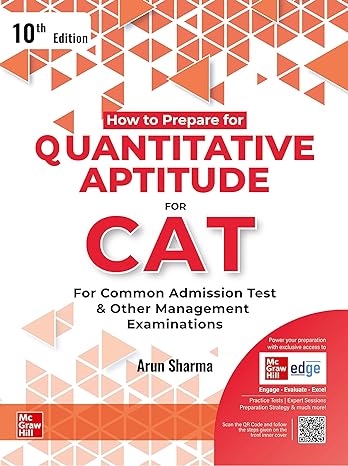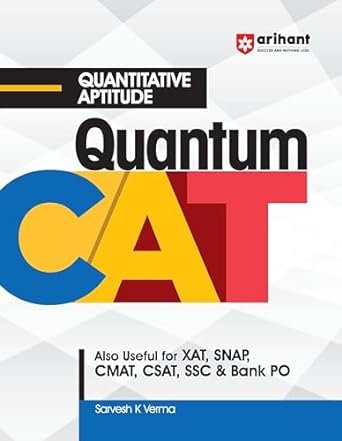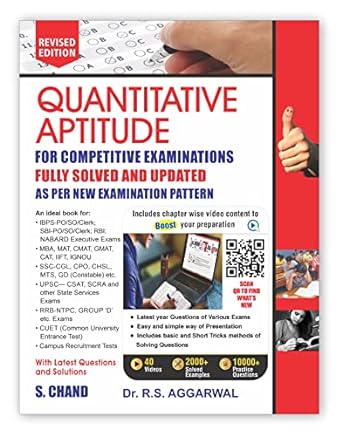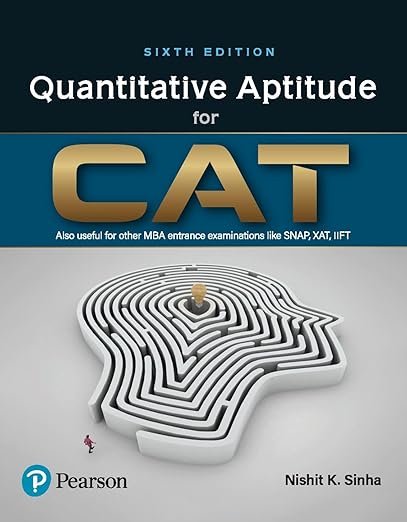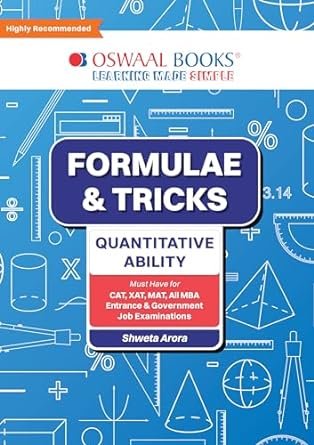Best Quantitative Aptitude Books for CAT 2025: Top Picks for Guaranteed Success
CAT Quant Books
Preparing for the CAT 2025 exam? If you’re aiming for a high percentile, you already know how critical the Quantitative Aptitude (QA) section is. Trust me, this section can either make or break your score! Whether you’re a math enthusiast or someone who struggles with numbers, having the right resources is essential. But with so many options available, it’s easy to feel overwhelmed. Don’t worry—I’ve been there, and in this guide, I’ll break down the best quantitative aptitude books for CAT that can help you nail this tricky section.

Why is Quantitative Aptitude so crucial? Well, for starters, it tests a range of mathematical concepts that go way beyond just basic arithmetic. The CAT quant section challenges your problem-solving speed and accuracy, which are crucial skills for any aspiring MBA student. But let’s be real: picking the right books is the first step toward achieving that perfect score. Let’s dive in!
Why Quantitative Aptitude is Crucial for CAT 2025?
The Quantitative Aptitude section of CAT is more than just a test of your math skills. It assesses your ability to think critically, solve problems under pressure, and work with numbers quickly. The QA section is often the deciding factor for many candidates, determining whether they land in the 90+ percentile or below. Here’s why mastering this section is crucial:
- Weightage in the CAT Exam: The CAT exam has three main sections—Verbal Ability and Reading Comprehension (VARC), Data Interpretation and Logical Reasoning (DILR), and Quantitative Aptitude (QA). Quant holds significant weight, often comprising about 34 questions out of the total 100. That’s a big chunk!
- Syllabus Scope: The syllabus for CAT quant is broad. It includes topics like Arithmetic, Algebra, Geometry, Modern Math, and Number Systems. Each of these areas requires a different approach, and mastering all of them is key to doing well.
- High Difficulty Level: Unlike some other entrance exams, CAT focuses on the application of concepts, not just memorization. This makes it important to have a deep understanding of each topic.
- Speed and Accuracy: In a test where you have limited time to answer each question, knowing shortcuts and tricks is a game-changer. The best books can help you develop these time-saving strategies.
Top 5 Quantitative Aptitude Books for CAT 2025
1. “How to Prepare for Quantitative Aptitude for the CAT” by Arun Sharma
Rating: 9/10
Arun Sharma’s book is a staple for CAT aspirants. Its strength lies in the systematic approach and the way concepts are explained from the basics to advanced levels. The book is divided into multiple sections, covering everything from Arithmetic to Algebra, Geometry, and Modern Math. A particularly valuable feature is the division of questions into three levels of difficulty: LOD 1, LOD 2, and LOD 3. This structure allows you to gradually increase your problem-solving ability as you progress.
Why it’s great:
- Gradual difficulty levels.
- Thorough explanation of concepts.
- Plenty of practice questions.
Where it can improve:
- Some students find it overwhelming due to the depth of content.
2. “Quantitative Aptitude Quantum CAT” by Sarvesh K. Verma
Rating: 8.5/10
Sarvesh K. Verma’s “Quantum CAT” is another top contender. Known for its variety of problems, it’s particularly useful for students aiming for high scores. This book contains both easy and challenging quant questions, and each chapter is well-organized with concept-building exercises. The detailed solutions and strategies for solving difficult questions make it a useful companion.
Why it’s great:
- Wide range of problems.
- Concept clarity with detailed explanations.
Where it can improve:
- Lengthy; it can be hard to cover if you start late in your preparation.
3. “Quantitative Aptitude for Competitive Examinations” by R.S. Aggarwal
Rating: 8/10
While R.S. Aggarwal’s book is a classic for many competitive exams, including CAT, it’s especially beneficial for those who want to build a strong foundation. It focuses heavily on the basics, making it ideal for beginners. The book includes thousands of questions across a range of topics. However, it lacks advanced-level problems, which are essential for a competitive exam like CAT.
Why it’s great:
- Great for foundational learning.
- Covers a broad array of topics.
Where it can improve:
- Not enough advanced questions for higher-level CAT preparation.
4. “Quantitative Aptitude for CAT” by Nishit Sinha
Rating: 7.5/10
Nishit Sinha’s book is designed with CAT’s specific syllabus in mind. It’s broken down into topic-wise sections that make it easier to focus on your weak areas. One standout feature is the mock tests and test-taking strategies included in the book, which are very useful for final-stage preparation. While it covers the basics and advanced topics, some readers feel the explanations could be more detailed.
Why it’s great:
- Topic-wise practice with mock tests.
- Strategic approach to test-taking.
Where it can improve:
- Some explanations lack depth.
5. Oswaal CAT 25 Years’ Chapter-wise and Topic-wise Solved Papers: Quantitative Aptitude
Rating: 9/10
The Oswaal CAT 25 Years’ Chapter-wise and Topic-wise Solved Papers: Quantitative Aptitude is an excellent resource for CAT aspirants who wish to gain familiarity with the exam’s evolving patterns over the years. By breaking down the last 25 years of CAT quantitative aptitude questions, this book provides a retrospective look at the type and difficulty level of questions, allowing candidates to understand what the CAT exam demands.
Key Features:
- 25 Years of Solved Papers: The book compiles solved papers from the last 25 years, offering valuable insights into the nature and trends of CAT questions over time. This makes it an excellent resource for students aiming to understand long-term question patterns.
- Chapter-wise and Topic-wise Categorization: The solved questions are meticulously organized by chapters and topics, making it easy to focus on specific areas like arithmetic, algebra, geometry, and modern mathematics.
- Detailed Solutions: Each question comes with detailed, step-by-step solutions to ensure that students grasp the underlying concepts and approaches needed to solve CAT-level problems.
- Exam Insights: The book provides key takeaways and insights from previous exams, such as trends in question types, frequently asked topics, and areas that require particular attention.
- Multiple Approaches: For some problems, the book offers multiple approaches to solving them, helping students develop flexibility in problem-solving.
- On-the-Go Revision: The book includes useful tools like quick revision notes and a formula sheet that students can use to quickly revise key concepts.
Ideal for:
This book is ideal for candidates who are looking to boost their problem-solving skills by studying past CAT questions. It is especially useful for those aiming to revise important concepts and practice with real CAT-level problems while tracking how the exam’s quantitative aptitude section has evolved over the years.
Oswaal’s approach to organizing 25 years of questions by topics and chapters provides a unique advantage, offering students targeted practice and the ability to easily identify their weak areas. It’s particularly beneficial for students who want to reinforce their preparation by working through actual CAT questions and solutions.
How to Choose the Right Quantitative Aptitude Book for You?
With so many great options available, it can be tough to choose the right one. Here are some tips to help you decide:
- Identify Your Level: Are you a beginner or someone who’s already familiar with basic math concepts? If you’re new to the subject, start with a book that explains the basics, like R.S. Aggarwal’s or Arun Sharma’s.
- Look for Updated Editions: CAT is a dynamic exam, with the pattern and difficulty level changing every year. Make sure to choose the latest edition of any book to ensure you’re getting up-to-date content.
- Combination of Books: Often, one book may not be enough. For instance, you can use Arun Sharma’s book for concept building and Sarvesh Verma’s book for advanced practice.
- Practice, Practice, Practice: Look for books that offer a good mix of theory and practice problems. A book with only theoretical concepts won’t help you score well in CAT.
- Time Management Focus: Books that offer shortcuts and time-saving techniques are a must. Rajesh Verma’s book, for example, focuses heavily on quick tricks.
How to Maximize Your Learning with Quantitative Aptitude Books?
Getting your hands on the best books is just the first step. How you use these books in your preparation will determine your success. Here’s a game plan to make the most out of these resources:
- Create a Study Plan: Divide the topics you need to cover based on the book you’re using. For example, if you’re working with Arun Sharma’s book, set daily goals for each difficulty level (Easy, Moderate, and Tough).
- Start with Basics: Even if you’re confident, begin with the basics. This will help reinforce concepts and clear any doubts you may have. Books like R.S. Aggarwal’s can be a great starting point.
- Solve Mock Tests Regularly: Mock tests simulate the real exam environment and help improve speed and accuracy. Many of the books, such as Arun Sharma’s, include mock tests that are highly beneficial.
- Revisit Tough Topics: After you complete a topic, revisit it after a week to ensure you retain the concepts. This can also help you identify weak areas that need more attention.
- Learn Shortcuts and Time-Saving Techniques: Books like “Fast Track Objective Arithmetic” focus on tricks and shortcuts that can save you valuable time during the exam.
Supplementary Resources: Beyond Books for CAT Quantitative Aptitude
Books are great, but there are other resources out there that can supplement your preparation. Here are a few that you should consider:
- Online Courses and Tutorials: Websites like Unacademy, Byju’s, and IMS offer online classes and doubt-solving sessions specifically for CAT quant.
- Practice Apps: There are several apps available that provide quant practice questions and mock tests. Some popular ones include Career Launcher’s app and Gradeup.
- Coaching Study Material: If you’re enrolled in coaching, make sure to use their study material. Institutes like TIME, IMS, and Career Launcher provide extensive study notes and practice tests.
- YouTube Channels: You can find free quant tutorials on YouTube that break down tough concepts into easy-to-understand videos. Some channels to check out include Takshzila Shikshak, Cracku and IMS
Conclusion
Mastering the Quantitative Aptitude section of the CAT exam is no easy feat, but with the right resources and a solid study plan, it’s definitely achievable. The books I’ve mentioned—whether it’s Arun Sharma for detailed practice or Sarvesh K. Verma for advanced problems—are tried and tested by toppers and experts alike. So, pick the ones that suit your learning style and dive in!
Remember, the CAT is not just about studying hard—it’s about studying smart. Practice regularly, learn shortcuts, and always keep an eye on the clock during practice tests. By using these resources and following a structured approach, you’ll be well on your way to acing the CAT Quantitative Aptitude section and getting one step closer to your dream B-school.
Now, it’s time to hit the books! Which one are you starting with? Feel free to share your experiences and tips in the comments below!

